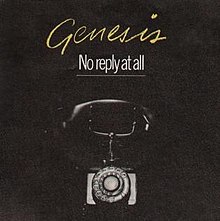
Genesis were an English rock band formed at Charterhouse School, Godalming, Surrey, in 1967. The band's longest-existing and most commercially successful line-up consisted of keyboardist Tony Banks, bassist/guitarist Mike Rutherford and drummer/singer Phil Collins. In the 1970s, during which the band also included singer Peter Gabriel and guitarist Steve Hackett, Genesis were among the pioneers of progressive rock. Banks and Rutherford were the only constant members of the group.

Face Value is the debut solo studio album by English drummer and singer-songwriter Phil Collins, released on 13 February 1981, by Virgin Records in the United Kingdom and Atlantic Records in North America. After his first wife filed for divorce in 1979, Collins began to write songs during a break in activity from Genesis with much of the material concerning his personal life. The album was recorded from mid-1980 to early 1981 with Collins and Hugh Padgham as producers. Additional musicians include the Phenix Horns, Alphonso Johnson, and Eric Clapton.
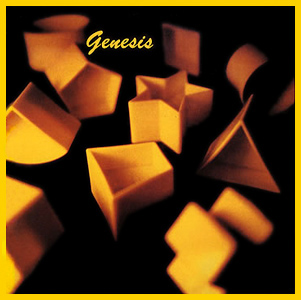
Genesis is the twelfth studio album by English rock band Genesis, released on 3 October 1983 by Charisma and Virgin Records in the UK and by Atlantic Records in the US and Canada. Following the band's tour in support of their 1982 live album Three Sides Live, Genesis took an eight-month break before they regrouped in the spring of 1983 to record a new album. It is their first written and recorded in its entirety at their studio named The Farm in Chiddingfold, Surrey, and the songs were developed through jam sessions in the studio with nothing written beforehand. Hugh Padgham returned as their engineer.

Duke is the tenth studio album by English rock band Genesis, released on 28 March 1980 on Charisma Records. The album followed a period of inactivity for the band in early 1979. Phil Collins moved to Vancouver, Canada, in an effort to salvage his failing first marriage, while Tony Banks and Mike Rutherford recorded solo albums. Collins returned to the UK after his marriage ended and wrote a significant amount of material, some of which was used for Duke and some was later reworked for his first solo album, Face Value. Duke contained a mix of individually written songs and tracks that evolved from jam sessions in mid-1979, while recording took place at the end of the year. The break in activity rejuvenated the band, and they found the album an easy one to work on.

Abacab is the eleventh studio album by English rock band Genesis, released on 18 September 1981 by Charisma Records. After their 1980 tour in support of their previous album, Duke (1980), the band took a break before they reconvened in 1981 to write and record a new album. Abacab is the first Genesis album recorded at The Farm, a recording studio bought by the group in Chiddingfold, Surrey. It marked the band's development from their progressive roots into more accessible and pop-oriented songs, and their conscious decision to write songs unlike their previous albums.
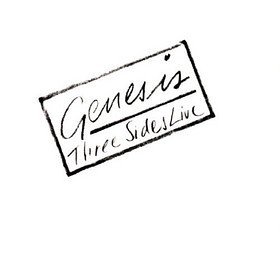
Three Sides Live is the third live album by the English rock band Genesis, released as a double album on 4 June 1982 on Charisma Records in the United Kingdom. It was released by Atlantic Records in the United States. After touring in support of their studio album Abacab ended in December 1981 the band entered an eight-month break in activity, during which they selected recordings from their previous tours for a live album. Three Sides Live includes recordings between 1976 and 1981; the UK edition contains additional live tracks on the fourth side of the double LP, while the original international edition featured tracks from their 1982 EP 3×3 and B-sides from Duke. Subsequent international reissues have adopted the UK track sequence.

"Hot Fun in the Summertime" is a 1969 song recorded by Sly and the Family Stone. The single was released just prior to the band's high-profile performance at Woodstock, which greatly expanded their fanbase. The song peaked at number 2 on the U.S. Billboard Hot 100 pop singles chart, kept out of the number 1 spot by "I Can't Get Next to You" by The Temptations. "Hot Fun in the Summertime" also peaked at number 3 on the U.S. Billboard soul singles chart in autumn 1969. It is ranked as the seventh biggest U.S. hit of 1969, and the 65th in Canada.

3×3 is the second extended play by the English rock band Genesis, released on 10 May 1982 on Charisma Records. Its three songs were originally written and recorded for their eleventh studio album Abacab (1981), but they were not included on the album's final track selection. 3×3 reached No. 10 on the UK Singles Chart. In the US, its tracks were included on the international edition of the band's live album Three Sides Live (1982). The lead track, "Paperlate", peaked at No. 32 on the US Billboard Hot 100 singles chart and No. 2 on the Billboard Mainstream Rock Tracks chart.
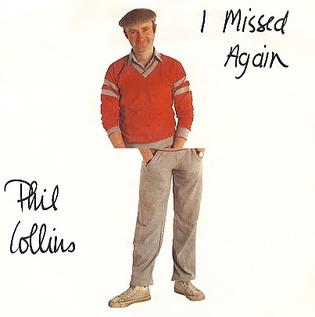
"I Missed Again" is a song from Phil Collins's debut solo album, Face Value. It was selected as the lead single from the album in the US and Canada, although in most other countries "In the Air Tonight" was released as Collins' first solo single, followed by "I Missed Again". The song features a tenor sax solo from British jazz musician Ronnie Scott.

"Invisible Touch" is the title track and first single from the 1986 studio album of the same name by the English rock band Genesis. The song is a group composition which featured lyrics written by drummer and lead vocalist Phil Collins.

"Laughter in the Rain" is a song composed and recorded by Neil Sedaka, with lyrics by Phil Cody. It includes a 20-second saxophone solo by Jim Horn. The song hit No. 1 on the Billboard Hot 100 in February 1975.

"That's All" is a song by the English rock band Genesis. It is a group composition and appears as the second track on their self-titled album (1983). It was the album's second single after "Mama". On June 17, 1993, MCA Records re-issued and re-released the song as a CD and "HiQ" cassette single.
"Behind the Lines" is a song by the English progressive rock band Genesis, from their 1980 album Duke. The group's drummer and vocalist Phil Collins released a re-recorded version on his first solo album Face Value in February 1981.

"How Long" is the debut single by the English band Ace, from their 1974 debut album, Five-A-Side. It reached No. 3 on both the US and Canadian charts, and No. 20 on the UK Singles Chart.

"Paperlate" is a song by the British rock band Genesis from their second of two EPs. The EP, titled 3×3, peaked at No. 10 on the UK Singles Chart in mid-1982. The success of the EP led to an appearance on Top of the Pops. In the US and Europe, "Paperlate" was released as a standard single, backed by "You Might Recall". It was also featured on the U.S. version of the band's Three Sides Live album, of which all three tracks from the 3×3 EP are included on side four.

"Man on the Corner" is a 1981 song by British rock band Genesis, released as a single on 5 March 1982. The song is from the band’s Abacab album, and was written and sung by drummer Phil Collins. It peaked at No. 41 on the UK Singles Chart and No. 40 on the U.S. Billboard Hot 100.
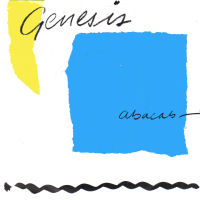
"Abacab" is a song by the British rock band Genesis, released on 14 August 1981. It was produced by Genesis and distributed in the United States by Atlantic Records and Warner Music Group. The song, mainly written by Mike Rutherford with Tony Banks and Phil Collins with lyrics by Rutherford, was featured on Genesis' album of the same name and was a top 10 hit on the British pop chart, where it peaked at No. 9. The song was the second single from the album in the US, where it peaked at No. 26 on the Billboard Hot 100 chart in early 1982. It stayed in the Top 40 for six weeks.
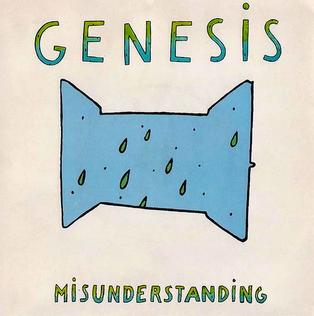
"Misunderstanding" is a song by the English rock band Genesis, released on their 1980 album Duke. It reached No. 14 in the U.S. and No. 42 in the UK. Its highest charting was in Canada, where it reached No. 1 and is ranked as the seventh biggest Canadian hit of 1980. It was also featured on the band's 1982 double-album Three Sides Live, where it led off side three.
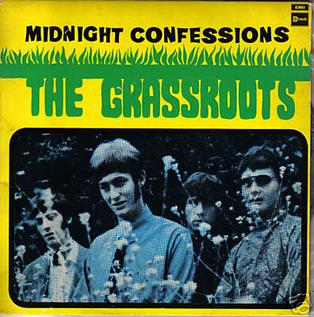
"Midnight Confessions" is a song written by Lou T. Josie and originally performed by the Ever-Green Blues. American rock band The Grass Roots later made it famous when they released it as a single in 1968. Though never released on any of the group's studio albums, it was on their first compilation album, Golden Grass, and has since been included on many of their other compilations.

Three Sides Live is a 1982 concert film featuring the English rock band Genesis. It was released in support of the band's same-titled live double album released in June 1982. Directed by Stuart Orme, the film features live performances from two shows during the band's 1981 tour of Europe and North America in support of their studio album Abacab. The shows are from 28 and 29 November 1981 at The Savoy and Nassau Coliseum, New York, respectively. The film includes interviews footage shot backstage and the group travelling with the crew and families. Some of the featured songs are incomplete due to editing.
